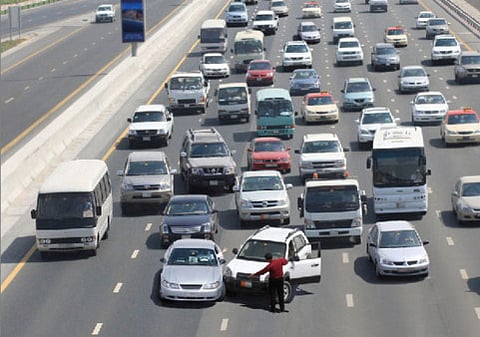Rubberneckers: A real pain!
Gulf News readers share thoughts on why people feel the need to slow down.

Dubai: Rubbernecking, the act of slowing down while driving in order to stare at something, can be a pain in the neck...literally. Motorists spend anything between a few minutes to hours in traffic caused by accidents and rubberneckers. Gulf News readers suggest implementing fines and penalising the curious few or installing screens around accident sites to stop people from gaping. We speak to them and an expert on why people feel the need to slow down and see what is going on.
Rubbernecking may reduce the capacity of a road by roughly 50 per cent in both directions even though the accident itself or police have not blocked multiple lanes, according to the Dubai Police’s official website.
Gulf News reader Sebastian Tan, a Dubai resident, has no hope for the situation to ever improve.
He said: “Such situations will not change despite the efforts made to try and eradicate this bad habit. Whenever I am caught in traffic, I am sure that it is due to an accident and rubberneckers. It is concerning to me that many motorists are still quite inconsiderate and will slow down even if the road ahead is clear and an incident is not affecting them. Drivers like me who just want to move on have no choice but to remain patient and slow down with the rest of them. Unless, the incident is serious enough and if I am in a position to help the victim, I will park my car aside without causing any obstruction to others.”
When asked why he thinks people feel the need to rubberneck, Tan said it was “human instinct”.
He said: “It can’t be changed, although some motorists are genuine in wanting to see if they can help the victims or assist the authorities in any way. Frankly, I do not think it can be stopped and such practices happen worldwide. We can only advise drivers and continue to have campaigns to educate them in the hopes that they can understand the problem they are causing to others.”
Zain Rizwan, a Dubai resident, thinks it is too hard for motorists to resist watching.
He said: “The most galling and unnecessary source of incident-related congestion is rubbernecking. Traffic congestion is caused even when the wreck is moved out of the lanes, as passing drivers gape at the carnage. Rubbernecking is one of the more interesting cases of moral whipsawing I can think of. All the time we wait in traffic, we are upset with the drivers ahead of us. But, when it’s our turn at the front of the line, we all want to have just a quick peek. Even if the sight of an accident doesn’t thrill you, curiosity about what caused you to waste 45 minutes is often just too powerful to resist.
“Besides, we waited our turn and it’s only fair that we senselessly victimise others the way we were victimised. The pinnacle of transportation-related annoyance may be that not only does rubbernecking take place along the route where the accident happens, but it can even cause severe traffic in the lanes going the opposite direction. How about setting up screens at accident sites to hide the scene and prevent gaping?”
Sandhya Shetty, a resident of Sharjah, blames it on people’s curiosity.
She said: “I feel like this is something to do with our pscyhcological thinking. It’s like when we see fire, more than going ahead and thinking of how to help douze the fire, our inquisitive mind wants to know and be a part of what’s happening around. Soon a crowd gathers. It’s like a herd. I don’t know of anyone, having observed people, who wouldn’t slow down and look at the scene of an accident. It is like a natural phenomenon to stop and watch what happened and introspect on how it happened.”
Shetty is concerned that the habit of rubbernecking is affecting the response time by the civil authorities.
She said: “While rubbernecking is common in the UAE, I want to make a sincere request to people to avoid the same because they are becoming a hindrance to services like patrol vehicles and ambulances. It takes them longer to reach the place. If we did not waste their time, it would increase the chances of survival in case a victim is caught severely in an accident. If you witness an accident occur, do your bit as a civilian and call the police. The authorities could consider strict penalties so that their jobs are not hindered.”
Mamachan P. T., a Dubai resident, agrees with penalising the rubberneckers.
He said: “When driving, if you suddenly see a traffic block you naturally assume that there might be an accident ahead. But, to our surprise, when we drive along we find nothing but traffic created by people looking at an accident that has occurred on the opposite side. I do not say it is wrong to observe at a glance, but it should never be at the cost of slowing down, which sometimes even leads to minor accidents. Such observance should never be allowed and should be penalised for. To recognise who created the traffic congestion may not be easy, but some way should be chalked out so the authorities can discourage this practice. When people lose a fortune, they will choose not to rubberneck.”
Prasad Warrier, a resident of Sharjah, is concerned about people spending too much time in traffic.
He said: “Quite often, even if it is a minor accident, you notice people slowing down to see the impact and damage caused by an accident. It affects the traffic movement and delays our arrival at our required destination. I personally think that the police should start implementing fines for those who drive at a slow pace or stop to observe an accident site. Next time, they will think twice before slowing down their vehicles.”



